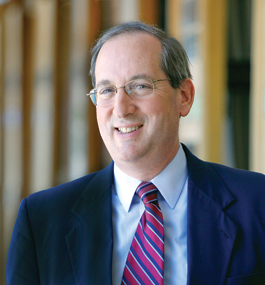Making a Match
President-elect Fred Lawrence is a natural educator, civil rights and First Amendment expert, scholar and community builder. And, like Louis Brandeis, he’s committed to applying law to social-justice issues.

Mike Lovett
President-Elect Frederick M. Lawrence
by Laura Gardner
When Frederick M. Lawrence becomes the university’s eighth president Jan. 1, he will follow in the footsteps of historians, social and research scientists, legal scholars, and even a physician. But already, he has begun to build his own pathways into the life of the university.
Shuttling this fall between Brandeis and George Washington University law school in Washington, D.C., where he will step down as dean in November, Lawrence and his wife Kathy have embraced seemingly every opportunity to interact with students, faculty and staff. They participated in student move-in day, meet-and-greet receptions, faculty meetings and meals. In a presidential first, Lawrence led Yom Kippur services last month at Spingold Theater. He is also planning a presidential blog.
A leading expert on civil rights and free expression, Lawrence even participated in a panel discussion analyzing the recent appointment of Elena Kagan to the U.S. Supreme Court. All this without ever relying on a written speech — Lawrence says he prefers to speak extemporaneously, which he does with both charm and precision.
“Kathy and I love engaging Brandeis students, and our new home will play a major role in the life of the school,” says Lawrence, before joking, “As president, how will I divide my time? I’ll spend 50 percent of my time with students, 50 percent with faculty, and 50 percent with alumni and supporters.”
Lawrence’s distinguished career as a legal scholar, an educator and a practicing lawyer seems to have prepared him well for his new job at Brandeis. “It’s a perfect fit,” he notes, “a calling.” Brandeis’ historic roots in the Jewish community, coupled with its commitment to social justice, diversity and academic rigor, are all qualities that resonate deeply with Lawrence. If he appears to be a natural-born educator, it may be because his mother taught high school English for four decades. One example of this pedagogical bent, his GW blog, “20th and H,” offers a series of conversational “teachable moments” about law, the legal profession and education.
When the board of trustees announced in July its unanimous decision to appoint Lawrence as Brandeis’ next president, he posted a pledge to the Brandeis community. In it, the president-elect wrote, “I draw profound fulfillment from supporting colleagues and students with the intellectual tools, the practical resources and the personal encouragement to turn their visions into reality. I feel this drive even more now as I join this community of faculty and students.”
Lawrence, 55, earned a B.A. at Williams College in 1977 and a J.D. from Yale University in 1980. He began his legal career in 1980 as clerk to Judge Amalya L. Kearse of the U.S. Court of Appeals for the Second Circuit. Later, he was named an assistant U.S. attorney for the southern district of New York, where he became chief of the civil rights unit under Rudolph Giuliani.
In 1988 Lawrence joined the faculty of the Boston University School of Law and taught courses on civil rights enforcement and civil rights crimes, criminal law, and civil procedure. In 2005, he became dean and Robert Kramer Research Professor of Law at George Washington University’s law school. He has written, lectured and testified widely on civil rights crimes and is the author of many publications, including the influential book “Punishing Hate: Bias Crimes Under American Law.”
While singing is not listed on his curriculum vitae, it plays a vital role in his personal life. In the early 1980s Lawrence performed with the New York Choral Society at Carnegie Hall, including holiday concerts with the folk trio Peter, Paul and Mary.
Kathy Lawrence, who earned a doctorate in American studies at Boston University, was a professor of English at GW, specializing in 19th-century American literature. Ensconced in a Cambridge apartment while the couple awaits a move into the Brandeis president’s house late next spring, she is spending this year completing a book on the “missing transcendentalist” Caroline Sturgis Tappan and several scholarly articles. The Lawrences have two grown children, Miriam and Noah.
Lawrence will confront challenging economic realities when Brandeis’ current president, Jehuda Reinharz, Ph.D. ’72, steps down at the end of this year to head the Cleveland-based Mandel Foundation. But in the long run, Lawrence believes Brandeis embodies a model of higher education most likely to thrive among top-tier institutions.
“Brandeis is well positioned because it is a small liberal arts college with a world-class research enterprise in the sciences and social sciences, humanities and creative arts,” says Lawrence. “Small colleges can’t offer the high level of professional and research opportunities that we can, while large universities generally don’t focus primarily on undergraduate students.”
That Brandeis University was named for one of the great U.S. Supreme Court justices, noted for his contributions to protecting free speech, advancing law as an engine of social change, and promoting the interests of American Jews, is particularly meaningful to Lawrence. To this president-elect, Justice Brandeis is a kindred spirit.
“Justice Brandeis is an example of a life well lived in the law,” says Lawrence. Many people would say the same of Fred Lawrence.
